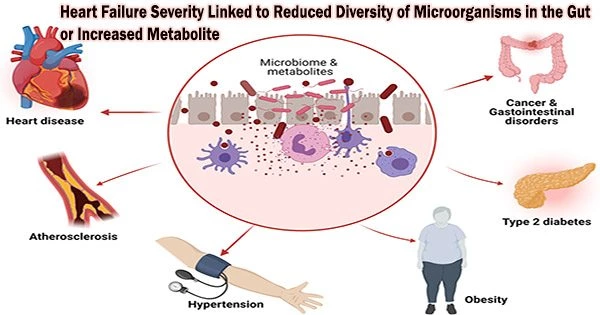According to a systematic review of research results led by Georgetown University School of Nursing & Health Study researchers and associates, some people who experience heart failure have less biodiversity in their gut or have elevated gut metabolites, both of which are connected with more hospital visits and a higher risk of death.
The gut microbiome is mostly made up of bacteria but also includes viruses, fungus, and protozoa. It is a finely balanced ecology. Heart failure, which kills over six million Americans every year and is a leading cause of death in the country, is frequently the final stage of a progressive cardiovascular illness. This condition can be influenced by the microbiome.
In order to create a comprehensive picture of how the microbiome can affect heart failure, the researchers examined seven years’ worth of genetic, pharmaceutical, and other sorts of research data from around the world.
Trimethylamine-N-oxide (TMAO), which can be created by the churning of gut bacteria when full-fat dairy products, egg yolks, and red meat are consumed, was the focus of the researchers’ attention.
We are currently developing a forward-looking study to evaluate the microbiome in patients with heart failure. We are particularly interested in the symptomatic experience of patients with end-stage heart failure as well as disease-related weight loss and wasting during this stage of cardiovascular disease.
Kelley Anderson
The analysis appeared June 20, 2022, in Heart Failure Reviews.
“To diagnose and manage heart failure we rely on certain findings and test results, but we do not know how poor heart function influences the activities of the gut, including the absorption of food and medications,” says Kelley Anderson, PhD, FNP, CHFN, associate professor of nursing at Georgetown and corresponding author of the study.
“There is now an appreciation of a back-and-forth relationship between the heart and elements in the gut, as clearly the heart and vascular system do not work in isolation the health of one system can directly influence the other, but clear connections are still being worked out scientifically.”
The investigators parsed 511 research articles published between 2014 and 2021 that connected the microbiome with heart failure and winnowed their focus to the 30 most relevant articles.
Recent studies were especially interesting since they drew on increasingly sophisticated technology, notably instruments that can closely investigate the biological functions of DNA and RNA in the body.
Due to a dearth of solid data from the papers they evaluated, the researchers were unable to determine how nutrition affected the interaction between the microbiota and the cardiovascular system.
The investigators noted that nutrition is an important component of overall cardiovascular health, so having the opportunity to explore the impact of diet in relation to the microbiome is a promising area for future research efforts.
In terms of possible interventions to mitigate negative impacts of the microbiome on heart disease, Anderson noted that there are ongoing studies evaluating the use of antibiotics, prebiotics and probiotics, all of which can impact the microbiome, as well as intestinal binders that glom on to and help shuttle harmful elements out of the gut.
“We are currently developing a forward-looking study to evaluate the microbiome in patients with heart failure. We are particularly interested in the symptomatic experience of patients with end-stage heart failure as well as disease-related weight loss and wasting during this stage of cardiovascular disease,” says Anderson.
















